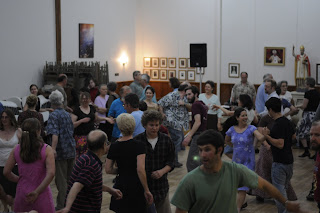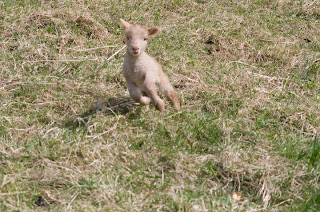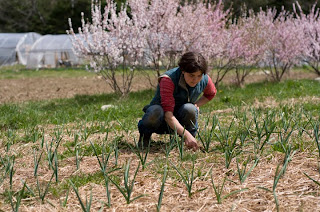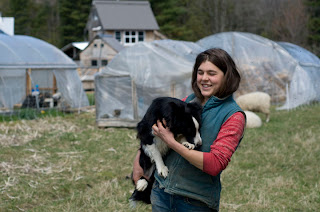Good evening to all who are reading...
Trav and I have spent the past several days traveling around talking to different farmers ("fahmas" you'd say if you were from Maine) and learning about the state of agriculture in the state of Maine. Along with that we have also played with pigs, attended a small town contra dance, snuck into a college gymnasium to take (much needed) showers, sat around a midnight bonfire at a goat roast, eaten parsnips for the first time, (Kacy) dozenth time (Trav), heard the story line for an upcoming science fiction novel as we helped package seeds with a premier seed saving guru on the East coast, inhaled the fragrant combination of chicory, barley, and rye roasting, and planted 1,500 strawberry plants in exchange for a self-satisfied feeling and 16 sausage links made from relatives of the pigs in the back yard. Trav is preparing them as I write this and it smells heavenly (if you can imagine heaven smelling a little like vinegar and pork).
We started our interviewing right here in Whitefield Maine, talking with more or less retired dairy farmer Austin Moore. Austin touched on changes he's seen in his decades of farming, one of them being that wholesome food is not affordable for most people anymore, which is causing a nationwide health catastrophe. This is a common theme among the many of the farmers we've spoken to in Maine; farmers want to produce food for their neighbors but what they see happening is their farm products being trucked away to areas like the coast, where wealthier tourists have more disposable income to buy local and organic. Austin Moore was one of the first farmers in this region to use rotational grazing with his dairy cows, a practice he learned from New Zealanders in the 1980's. We saw Austin again at the evening contra dance as we promenaded, reeled, dosey-doed and practiced our swinging. If you ever find yourself fortunate enough to be in North Whitefield Maine on the fourth friday of the month you should put on your dancing shoes and head down to the baptist church.

Early the next morning we took off in our freedom rocket/the Element and visited two farms close by to each other. The first is Village Farm in Freedom, Maine, farmed by Polly and Prentice and their three sons and an apprentice. The farm is beautiful and there were signs of spring everywhere from newly hatched red peeping chicks and slightly bigger yellow chinese weeder goslings, to the smell of turned earth and the persistent green leaves of sprouting lettuce. The chinese weeding geese babies eat dandilions and other weeds, but apparently they look down their bills at people-produce making them an invaluable volunteer weed removal team at the farm.




We continued on to Smith Farm in Unity Maine, run by Rachel and Sam and their son and an apprentice from the local college. Smith Farm is powered with 4 draft horses, two black and two white Belgians. As we interviewed we followed the horses around pulling the "stone boat" and removing huge stones from the acre field that will be dedicated to CSA produce. It took all of us and our crowbars and chains and shovels to remove a particularly gigantic rock from the edge of a field. During the interview Sam talked about the reasons he and Rachel have chosen to use draft horses instead of gas powered machinery. Sam talked about wanting to try to
#1 Leave a smaller carbon footprint and
#2 Farm in a way that is more in tune with natural cycles- taking their time prepping fields and growing as opposed to pushing the land to produce as much as possible as often as possible.
We had the rest of the afternoon and evening free, so we headed to the college with it's big open fields so inviting to run around on with a frisbee and found we weren't alone. We joined the other throwers and found ourselves invited to an evening goat roast at a local cheesemaker's house. We kindly accepted and found ourselves later that night standing around a beautiful bonfire with Maine's salt-of-the-earth farming crowd talking about goats, tractors, government policy and cheese. We stayed and enjoyed the fire and the company until the crowd broke up around midnight and we retired to our mobile domain, where the stars and full moon looked gloriously bright through our roof.
South Paw Farm was next on our list of interviewees, and we rambled up Meg's drive the next morning in Unity to see what's happening on the farm. Meg is a 23-year-old farmer from Georgia who is running a CSA farm that offers vegetables, fruit, eggs, pork, goat's milk, chicken, and herbs. The goats have a wooden structure to climb all over and butt each other off of, and the sheep just had their babies so the soundtrack of our morning included the ever-present trilling of birds, buzzing of bees and bleating of the littlest lamb I've ever seen. Her farm was remarkably diverse for a small, new operation and her confidence suggested that she'll do well with her menagerie of animals, her CSA, and her community on and around the farm.




I am daunted at the thought of describing our meeting with Will Bonsall, seed saving king of New England, so I will end this post here and publish that account next time.
As Pete Seeger always says: Well may the world go!
0 comments:
Post a Comment